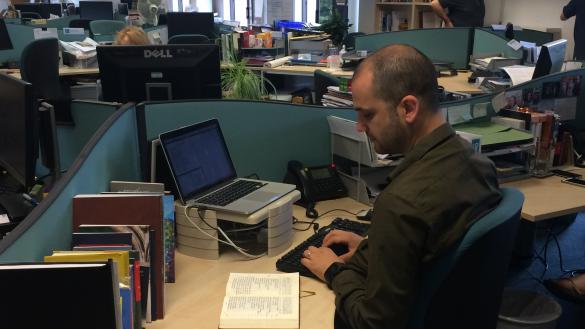A Day in the Life of a Bible Translator
This article was originally posted by the British and Foreign Bible Society.
Oldi Morava is translating the Old Testament into Albanian. We asked him about his average day.
A typical day
On a translation day, I’ll try to work from home and not open any emails. With translation, you need to be in the mood. If you are bombarded by requests for something else you’re not really in an environment where you can be very productive.
I start by reading through the passage that I’m going to translate in the original language. Then I begin writing the translation, one verse at a time.
 If it’s not a simple translation — for example, there isn’t a direct equivalent for the Hebrew word in Albanian or the original Hebrew is unclear — then I do more research. I spend a lot of time reading commentaries and look at the Hebrew context, as well as how other translators have handled the same verse in other languages.
If it’s not a simple translation — for example, there isn’t a direct equivalent for the Hebrew word in Albanian or the original Hebrew is unclear — then I do more research. I spend a lot of time reading commentaries and look at the Hebrew context, as well as how other translators have handled the same verse in other languages.
It can be very repetitive, especially when you’re translating building instructions
After hours and hours of collecting all this information, I come to a conclusion. And then I move on to the next verse! Depending on the difficulty of the text, I translate between 12-20 verses a day. It can be very repetitive, especially when you’re translating building instructions.
Poetry is always fun to translate. Not only are you trying to understand Hebrew poetry – which is very compressed – you’re also trying to generate something in your language that can sound like poetry. Being faithful to the text and generating something poetic can be quite difficult but you get more satisfaction out of it.
An atypical day
I meet with my translation team for one week five times a year. We all live in different countries so we meet somewhere we can all travel to. We’re all working on different books.
We’ll go over our work, reading it aloud verse by verse and making suggestions. We tend to have very fiery interaction but we’re good at coming to an agreement in the end. I learn so much from hearing how my colleagues view the Bible.
The other part of my job…
I’m also part of Bible Society’s International team, where I look after our partnership with Bible Societies in the West Balkans — Albania and Croatia, Slovenia, Serbia and Macedonia — and also with Congo Brazzaville. This involves working with budgets, selecting projects and seeing how those projects are doing.
I love visiting these Bible Societies. They’re often very small — perhaps five or ten people in one office. You encounter their passion and see what they are trying to do in their country, with very few resources and yet great ideas. Trying to help them is a very satisfying part of my job.
Oldi’s career path
1994-1999 High school
Majored in Business and Finance, with hopes of becoming a banker. Volunteered with Bible Society in Albania.
1999-2002 University
Studied BA in Applied Theology at Redcliffe College, England.
2003-2006 Work and ministry
Worked with local churches in London.
2007-2008 Language study
Received an invitation from the Albanian Bible Society to join the Old Testament translation team of new Albanian Bible translation. Studied MSt in Classical Hebrew at Oxford University.
2010 Translation begins
Working as part of a three-person team from across Christian traditions, books are assigned and translation begins.



